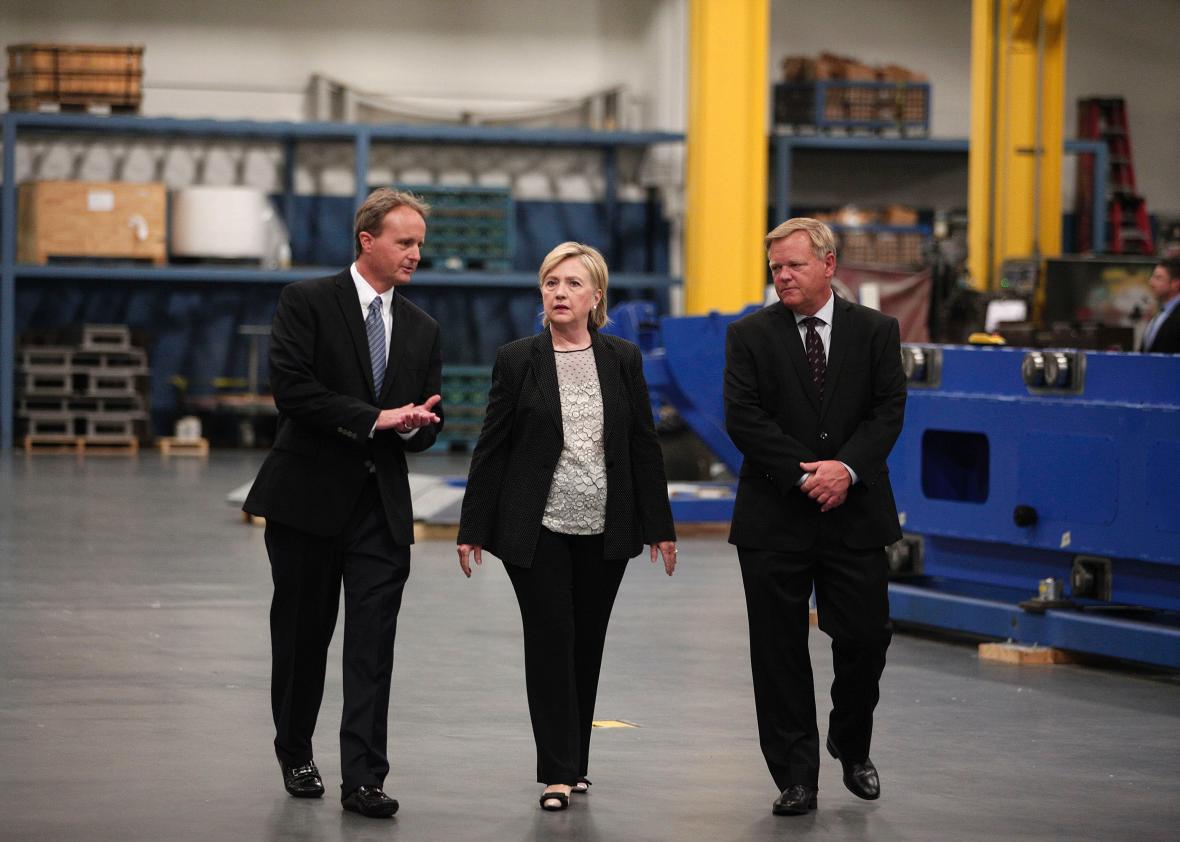Hillary Clinton performed some of her greatest policy hits on Thursday during what was billed as her rebuttal to Donald Trump’s economic speech in Detroit at the start of the week. In no particular order, the Democratic nominee called for: massive new infrastructure investment, expanding Obamacare, making college more affordable, increasing access to broadband internet, and closing tax loopholes used by corporations and the wealthy, to name a few. But far more interesting was that we briefly saw the outlines of something rarely spotted in this presidential race: an actual policy debate.
“He’s offered no credible plan to address what working families are up against today,” Clinton said in Warren, Michigan, before attempting to prove as much by going point by point through a handful of the economic policies that Trump spoke about in detail—or what passes for detail when he speaks, anyway—on Monday.
She mocked his plan to cut the tax rate business owners pay on personal income derived from their business to 15 percent as self-serving. (The current so-called “pass through” top rate is just under 40 percent.) “Let’s call it the ‘Trump loophole,’ because it allows him to pay less than half the current tax rate on income from many of his companies,” Clinton said. “He’d pay a lower rate than millions of middle class families. One nonpartisan expert at the Tax Policy Center described this plan as, I quote, a really nice deal for Donald Trump.”
She also hit him over his call to allow parents to deduct the average cost of child care in the United States on their annual taxes—a proposal that sounds like it would help struggling families but, given the reality of our tax code, would be a windfall for the wealthy while doing almost nothing for lower-class individuals. “I think instead, we should expand the child tax credit to provide real relief to tens of millions of working families struggling with the costs of raising children,” Clinton declared. “The same families that his plan ignores.”
And she saved some of her strongest words for Trump’s plan to end the estate tax, which the GOP nominee and his allies prefer to call the “death tax” while simultaneously omitting that it applies only to wealthy Americans. (An individual can leave the first $5.45 million to their heirs without paying any federal tax, while a married couple can leave $10.9 million.) “Now if you believe that he’s as wealthy as he says, that alone would save the Trump family $4 billion,” Clinton said of Trump’s proposal. “It would do nothing for 99.8 percent of Americans. So they’d get a $4 billion tax cut, and 99.8 percent of Americans would get nothing.”
Clinton, of course, could debate policy all day. Regardless of whether you like her actual ideas, it should be obvious to anyone that she takes far greater joy, and is far more capable, than Trump in diving into the weeds when talking about things like the earned income tax credit, broadband access, or student debt. Trump, meanwhile, steers clear of offering details whenever possible, instead opting for sweeping statements in place of specifics, which not incidentally denies Clinton the chance to respond in the type of wonkish detail she would like. As Trump memorably put it last year when fielding a question about his aversion to laying out his policy proposals in any detail: “I don’t think the people care. I think they trust me. I think they know I’m going to make good deals for them.”
This week, then, may have provided the closest thing to a traditional policy debate that we’re going to see in the general election campaign. Trump only got specific Monday in an attempt to convince skeptical Republicans that he was able to act like a normal candidate for more than a hot second. In the 72 hours since, though, he’s made it abundantly clear that he’d much rather talk about “Second Amendment people” and how President Obama “founded ISIS.” Those topics are unlikely to be winners with the American public come Election Day. They do, however, represent far more comfortable ground for the reality television star until that day comes.
